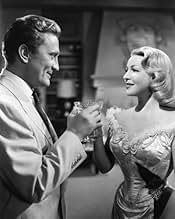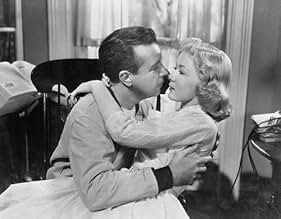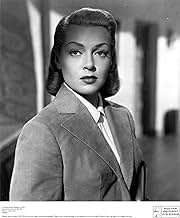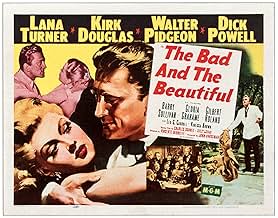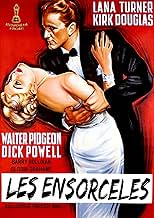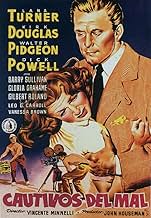CALIFICACIÓN DE IMDb
7.8/10
17 k
TU CALIFICACIÓN
Un productor de películas sin escrúpulos utiliza a una actriz, un director y un escritor para alcanzar el éxito.Un productor de películas sin escrúpulos utiliza a una actriz, un director y un escritor para alcanzar el éxito.Un productor de películas sin escrúpulos utiliza a una actriz, un director y un escritor para alcanzar el éxito.
- Ganó 5 premios Óscar
- 7 premios ganados y 7 nominaciones en total
Jay Adler
- Mr. Z - Party Guest
- (sin créditos)
Stanley Andrews
- Sheriff
- (sin créditos)
Del Armstrong
- Georgia's Makeup Artist - Screen Test Scene
- (sin créditos)
Ben Astar
- Joe - Party Guest
- (sin créditos)
Barbara Billingsley
- Evelyn Lucien - Costumer
- (sin créditos)
- Dirección
- Guionistas
- Todo el elenco y el equipo
- Producción, taquilla y más en IMDbPro
Argumento
¿Sabías que…?
- TriviaAt 9 minutes and 32 seconds, Gloria Grahame's performance in this movie became the shortest to ever win an Oscar. She held the record until 1976, when Beatrice Straight won for her 5 minute performance in Poder que mata (1976).
- ErroresThe story takes place over an 18-year period, roughly 1934-1952, but the hairstyles and clothing of all the women, from beginning to end, are strictly 1952.
- Versiones alternativasAlso available in a computer colorized version.
- ConexionesFeatured in Mundo, carne y deseo (1959)
Opinión destacada
"The Bad and the Beautiful" takes a look at Hollywood. This incisive take about how movies are made, directed by Vincente Minnelli, dares to go behind the scenes to show what goes on in the way the film industry operates. The film adaptation by Charles Schnee gives us a good idea of that unreal world of fantasy and hype.
At the center of the story is Jonathan Shields, a young man with connections to the industry. He wants to follow his father's footsteps and goes at it vigorously, making friends and enemies along the way. Jonathan discovers he can be ruthless whenever he wants. His first victim is Fred Amiel, the talented director who Jonathan bypasses in favor of a more established one. Jonathan quickly forgets the friendship Fred and his wife showed him before becoming a big producer.
Then there is there is Georgia Larrion, the boozy daughter of a famous actor. Jonathan shows how he wants Georgia to succeed in the business, personally taking care of selling her to star in his big project, only to betray her with another woman, a glamorous bit player. When Georgia discovers the truth, she flees Jonathan's mansion in a clear night that suddenly turns into a torrential downpour and loses control of the car, but she doesn't suffer a scratch!
The last victim of Mr. Shields is the Pulitzer prize winner, James Lee Bartlow, who Jonathan coaxes into leaving his academic life to adapt his own novel for the movies. James is married to the flighty Rosemary, in whom Jonathan discovers a weak link that will do anything to hobnob with the celebrities. Jonathan makes it easy for Rosemary to fall into an affair with the star of Shields' film.
When we first watched this film, it seemed much better, than on this viewing where a lot of things surface to make some of the story much weaker than before. Some viewers have compared this film with the fate of Orson Welles in Hollywood, and there are a couple of references that could be interpreted that way. Whether it was so, or not, it's up to the viewer to guess where the truth lies.
Kirk Douglas gave a strong performance as Jonathan Shields. Mr. Douglas showed he clearly understood who this man was. He runs away with the film, in our humble opinion. Lana Turner, a beautiful presence in any movie, is good, but at times she appears to be overwhelmed by the range of emotions she has to project, especially with that phony car scene.
Dick Powell and Gloria Graham put in an excellent appearance as the Bartlows. Barry Sullivan disappears after Lana shows up, not to be seen until the end. Walter Pigeon is effective as the studio head. Gilbert Roland is perfect as Gaucho, the Latin actor with a lot of charisma.
Mr. Minnelli shows he wasn't afraid to portray the industry the way we see it in the film, not a small accomplishment, knowing well how it could have backfired on him. Hollywood is not forgiving to those who dare to show its ugly side and that's when the parallel with Orson Welles problems with the system and eventual exile can be drawn.
At the center of the story is Jonathan Shields, a young man with connections to the industry. He wants to follow his father's footsteps and goes at it vigorously, making friends and enemies along the way. Jonathan discovers he can be ruthless whenever he wants. His first victim is Fred Amiel, the talented director who Jonathan bypasses in favor of a more established one. Jonathan quickly forgets the friendship Fred and his wife showed him before becoming a big producer.
Then there is there is Georgia Larrion, the boozy daughter of a famous actor. Jonathan shows how he wants Georgia to succeed in the business, personally taking care of selling her to star in his big project, only to betray her with another woman, a glamorous bit player. When Georgia discovers the truth, she flees Jonathan's mansion in a clear night that suddenly turns into a torrential downpour and loses control of the car, but she doesn't suffer a scratch!
The last victim of Mr. Shields is the Pulitzer prize winner, James Lee Bartlow, who Jonathan coaxes into leaving his academic life to adapt his own novel for the movies. James is married to the flighty Rosemary, in whom Jonathan discovers a weak link that will do anything to hobnob with the celebrities. Jonathan makes it easy for Rosemary to fall into an affair with the star of Shields' film.
When we first watched this film, it seemed much better, than on this viewing where a lot of things surface to make some of the story much weaker than before. Some viewers have compared this film with the fate of Orson Welles in Hollywood, and there are a couple of references that could be interpreted that way. Whether it was so, or not, it's up to the viewer to guess where the truth lies.
Kirk Douglas gave a strong performance as Jonathan Shields. Mr. Douglas showed he clearly understood who this man was. He runs away with the film, in our humble opinion. Lana Turner, a beautiful presence in any movie, is good, but at times she appears to be overwhelmed by the range of emotions she has to project, especially with that phony car scene.
Dick Powell and Gloria Graham put in an excellent appearance as the Bartlows. Barry Sullivan disappears after Lana shows up, not to be seen until the end. Walter Pigeon is effective as the studio head. Gilbert Roland is perfect as Gaucho, the Latin actor with a lot of charisma.
Mr. Minnelli shows he wasn't afraid to portray the industry the way we see it in the film, not a small accomplishment, knowing well how it could have backfired on him. Hollywood is not forgiving to those who dare to show its ugly side and that's when the parallel with Orson Welles problems with the system and eventual exile can be drawn.
- jotix100
- 15 jun 2005
- Enlace permanente
Selecciones populares
Inicia sesión para calificar y agrega a la lista de videos para obtener recomendaciones personalizadas
- How long is The Bad and the Beautiful?Con tecnología de Alexa
Detalles
- Fecha de lanzamiento
- País de origen
- Idioma
- También se conoce como
- The Bad and the Beautiful
- Locaciones de filmación
- Productora
- Ver más créditos de la compañía en IMDbPro
Taquilla
- Presupuesto
- USD 1,558,000 (estimado)
- Total a nivel mundial
- USD 2,025
- Tiempo de ejecución1 hora 58 minutos
- Color
- Relación de aspecto
- 1.37 : 1
Contribuir a esta página
Sugiere una edición o agrega el contenido que falta

Principales brechas de datos
What is the Japanese language plot outline for Cautivos del mal (1952)?
Responda


